Cover photo by Rob Dickinson.
Find the Smoky Spreadwing in the FBIS (Freshwater Biodiversity Information System) here.
Family Lestidae
Identification

False Bay, iSimangaliso Wetland Park, KwaZulu-Natal
Photo by Ryan Tippett
Medium sized
Length up to 49mm; Wingspan attains 58mm.
The Smoky Spreadwing most resembles Lestes plagiatus (Highland Spreadwing). The Smoky Spreadwing can be differentiated from other Spreadwings by the bronze-green thorax stripes, swollen pterostigmas with dark outlines, and smoky yellow wings. Older individuals become progressively darker and develop a bronzy colouration.
Females are similar but are duller. They have more robust abdomens than the males, and lack the pruinose terminal segments and the distinctive claspers.
The Smoky Spreadwing could also be confused with a Malachite (Chlorolestes spp.), but can be immediately recognised by its Blue eyes (Malachites have green or brownish eyes), and pale-centered pterostigmas.
Click here for more details on identification.
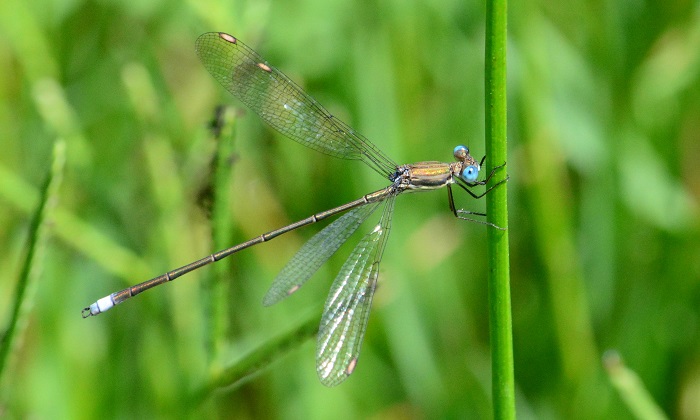
Near Ixopo, KwaZulu-Natal
Photo by Ryan Tippett
Habitat
The Smoky Spreadwing occurs at well-vegetated pans, pools, and marshes with forested or wooded fringes and emergent plant growth. It favours ponds with rich vegetation, particularly tall grasses, and forbs. The Smoky Spreadwing frequents areas of high rainfall above 700mm per year. It is found up to 1600m above sea level.

Near Hluhluwe, KwaZulu-Natal
Photo by Ryan Tippett
Behaviour
The Smoky Spreadwing hangs vertically from a grass or reed stem when at rest. It spends long periods perched and is generally sluggish and unwilling to fly. The females can be found alongside the males.
The Smoky Spreadwing is most active from late September to May, but flies all year at some sites (See Phenology below).
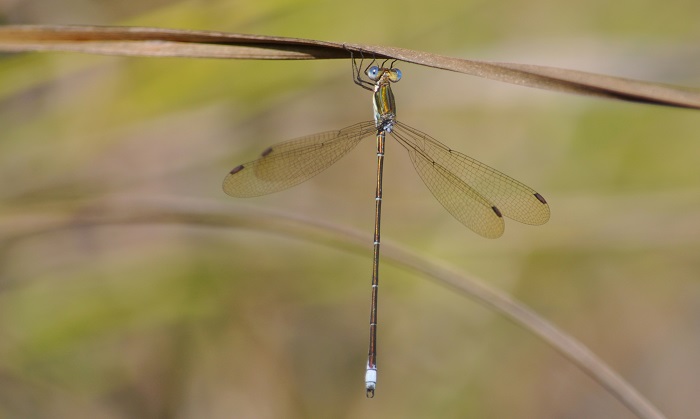
Ehlatini Bush Camp, KwaZulu-Natal
Photo by Ryan Tippett
Status and Conservation
Lestes virgatus is locally common over most of its range. It is listed as of Least Concern in the IUCN Red List of Threatened Species. The Smoky Spreadwing is moderately sensitive to habitat degradation and commonly occurs at suitable man-made habitats.
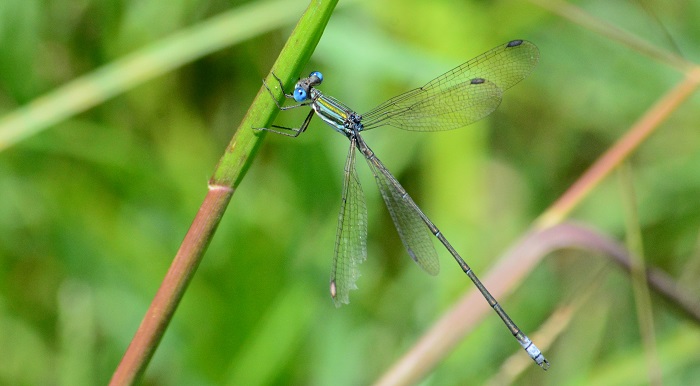
Near Ixopo, KwaZulu-Natal
Photo by Ryan Tippett
Distribution
The Smoky Spreadwing is native to much of Southern and Eastern Africa, where it is widespread. It extends from Ethiopia in the north down South Africa. There is also a seemingly isolated population in Nigeria. In South Africa, the Smoky Spreadwing occurs in the northern and eastern parts, as well as along the coast where it is warmer.
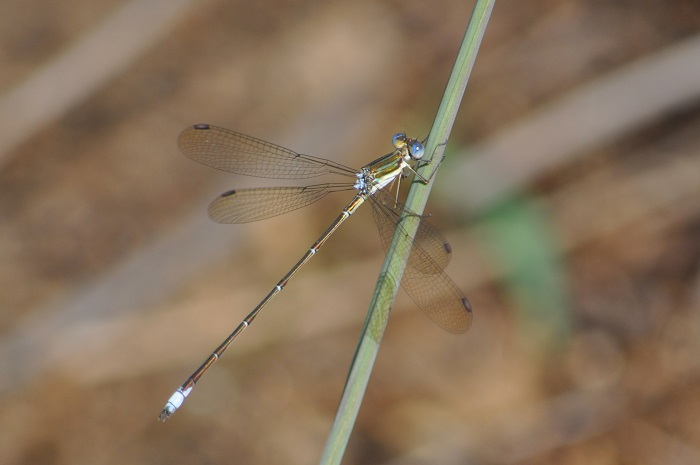
Ehlatini Bush Camp, KwaZulu-Natal
Photo by Ryan Tippett
Below is a map showing the distribution of records for Smoky Spreadwing in the OdonataMAP database as at February 2020.
Below is a map showing the distribution of records for Smoky Spreadwing in the OdonataMAP database as of December 2024.
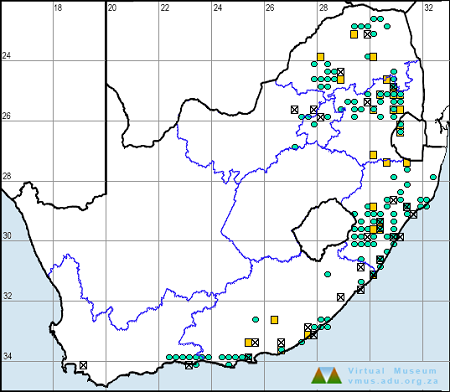
The next map below is an imputed map, produced by an interpolation algorithm, which attempts to generate a full distribution map from the partial information in the map above. This map will be improved by the submission of records to the OdonataMAP section of the Virtual Museum.


Ultimately we will produce a series of maps for all the odonata species in the region. The current algorithm is a new algorithm. The objective is mainly to produce “smoothed” maps that could go into a field guide for odonata. This basic version of the algorithm (as mapped above) does not make use of “explanatory variables” (e.g. altitude, terrain roughness, presence of freshwater — we will be producing maps that take these variables into account soon). Currently, it only makes use of the OdonataMAP records for the species being mapped, as well as all the other records of all other species. The basic maps are “optimistic” and will generally show ranges to be larger than what they probably are.
These maps use the data in the OdonataMAP section of the Virtual Museum, and also the database assembled by the previous JRS funded project, which was led by Professor Michael Samways and Dr KD Dijkstra.

Photo by Jean Hirons
Phenology


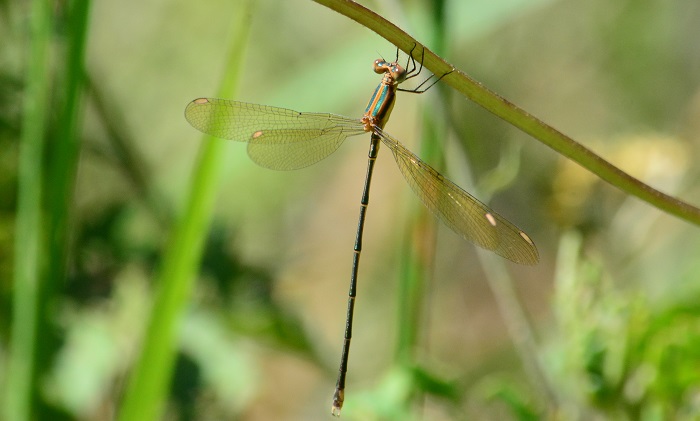
Mtunzini, KwaZulu-Natal
Photo by Ryan Tippett
Further Resources
The use of photographs by Jean Hirons and Rob Dickinson is acknowledged. All other photographs by Ryan Tippett.
Smoky Spreadwing Lestes virgatus (Burmeister, 1839)
Other common names: Rookspanvlerkie (Afrikaans)
Recommended citation format: Loftie-Eaton M; Navarro R; Tippett RM; Underhill L. 2025. Smoky Spreadwing Lestes virgatus. Biodiversity and Development Institute. Available online at https://thebdi.org/2020/02/13/smoky-spreadwing-lestes-virgatus/
References: Tarboton, M; Tarboton, W. (2019). A Guide to the Dragonflies & Damselflies of South Africa. Struik Nature.
Samways, MJ. (2008). Dragonflies and Damselflies of South Africa. Pensoft
Samways, MJ. (2016). Manual of Freshwater Assessment for South Africa: Dragonfly Biotic Index. Suricata 2. South African National Biodiversity Institute, Pretoria
Martens, A; Suhling, F. (2007). Dragonflies and Damselflies of Namibia. Gamsberg Macmillan.
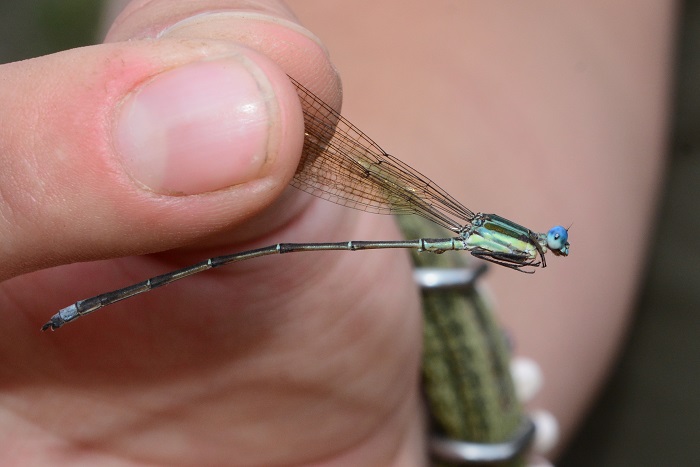
Hluhluwe district, KwaZulu-Natal
Photo by Ryan Tippett


